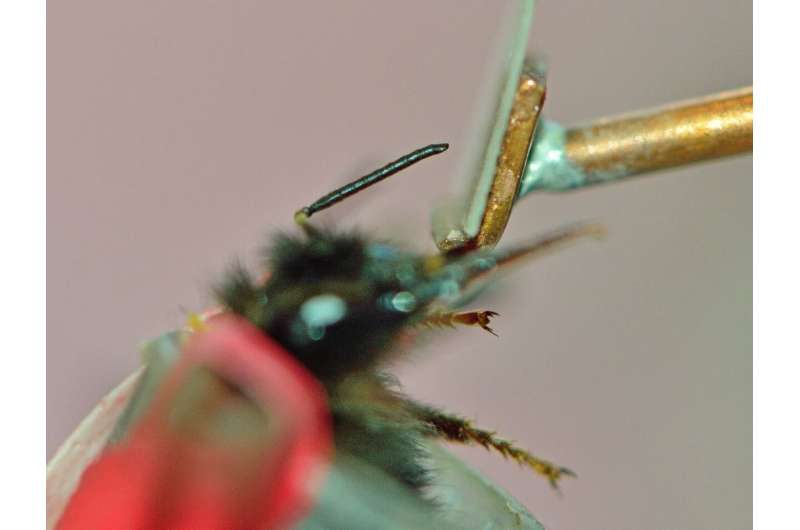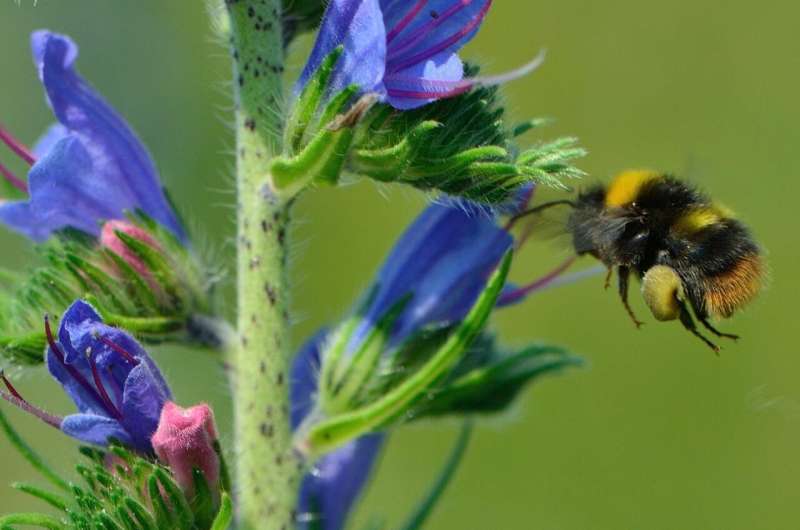Bumble bees prefer a low-fat diet

Bees are an important factor for our environment and our sustenance. Without insect pollination, many plant species—including various crops—cannot reproduce. "Bee mortality therefore affects food supply for human beings," said Professor Sara Leonhardt, who specializes in plant-insect interactions. All of the worldwide more than 20,000 bee species need to be considered. Among these, bumble bees are of particular importance besides the famous honey bee.
"Bees obtain most of their nutrients from their main food sources, which are nectar and pollen. While nectar is mainly a source of carbohydrates, pollen contains most of the other necessary nutrients: proteins, fat, minerals and vitamins. Until today, most bee researchers assumed that bees, like other herbivores, mainly consider the protein content when choosing their food," Professor Leonhardt explained.
Using a two-step mechanistic approach that included learning and feeding experiments, the group established a new way to literally keep a close eye on the feeding habits of insects.
Learning experiments with bumble bees (Bombus terrestris)
Which nutrients can bumble bees taste in pollen? As a first step, learning experiments helped the scientists to establish the bumble bees' preference for certain nutrients—in this case fat and protein.
Fabian Rüdenauer, main author of the study, explained: "We are focusing on fatty and amino acids, which represent the two essential pollen macro nutrients and which are likely to be perceived and thus tasted by bees."
In this context, small amounts of fatty acids were added to pollen to increase its fat content. The researchers found that bumble bees could clearly differentiate between normal pollen and pollen with increased fat content and did show a clear preference for normal pollen. Surprisingly, the bumble bees made no clear distinction when the pollen amino acid content was altered in the same way.

What is a bumble bee's preferred taste?
Which nutrients actually affect the bumble bees' foraging behavior and what are the consequences for their survival and reproductive capabilities? Those were the central questions guiding the subsequent feeding experiments.
"The more fat the pollen contained, the less the bumble bees consumed that pollen," Leonhardt concluded. Bumble bees actually accepted death over having to consume the high-fat pollen. The work group therefore concluded that fat in pollen adversely affects the bumble bees' reproductive capabilities and survival, which is why it is being avoided.
Similar to the learning experiment, variations in the amino acid content of pollen did not affect the bees' feeding habits, survival or reproduction.
Help for bees and bumble bees
"Our study highlights the importance of fat for foraging bumble bees. It also shows that there is a correlation between nutrient perception, nutritional regulation and reproductive fitness," stated Dr. Johannes Spaethe from the University of Würzburg, who also led the study. "The bees can taste what is good for them and collect their food accordingly," said Leonhardt, summarizing the results.
Currently, the researchers are creating a dataset on pollen nutritional chemistry in order to obtain an overview across the wide spectrum of different plant species. They are also examining the nutritional needs of other species of bees. "In the future, this may lead to better understanding the effect of variation in flowering plant species on bees, and it may improve protective measures such as flower strips in agricultural landscapes," predict the researchers.
More information: Fabian A. Ruedenauer et al, Best be(e) on low fat: linking nutrient perception, regulation and fitness, Ecology Letters (2020). DOI: 10.1111/ele.13454
Journal information: Ecology Letters
Provided by Technical University Munich















